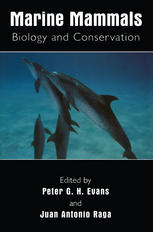

Most ebook files are in PDF format, so you can easily read them using various software such as Foxit Reader or directly on the Google Chrome browser.
Some ebook files are released by publishers in other formats such as .awz, .mobi, .epub, .fb2, etc. You may need to install specific software to read these formats on mobile/PC, such as Calibre.
Please read the tutorial at this link: https://ebookbell.com/faq
We offer FREE conversion to the popular formats you request; however, this may take some time. Therefore, right after payment, please email us, and we will try to provide the service as quickly as possible.
For some exceptional file formats or broken links (if any), please refrain from opening any disputes. Instead, email us first, and we will try to assist within a maximum of 6 hours.
EbookBell Team

4.7
26 reviewsInterest in marine mammals has increased dramatically in the last few decades, as evidenced by the number of books, scientific papers, and conferences devoted to these animals. Nowadays, a conference on marine mammals can attract between one and two thousand scientists from around the world. This upsurge of interest has resulted in a body of knowledge which, in many cases, has identified major conservation problems facing particular species. At the same time, this knowledge and the associated activities of environmental organisations have served to introduce marine mammals to a receptive public, to the extent that they are now perceived by many as the living icons of biodiversity conservation. Much of the impetus for the current interest in marine mammal conservation comes from "Save the Whale" campaigns started in the 1960s by environmental groups around the world, in response to declining whale populations after over-exploitation by humans. This public pressure led to an international moratorium on whaling recommended in 1972 by the United Nations Conference on the Human Environment in Stockholm, Sweden, and eventually adopted by the International Whaling Commission ten years later. This moratorium largely holds sway to this day, and further protective measures have included the delimitation of extensive areas of the Indian Ocean (1979) and Southern Ocean (1994) as whale sanctuaries.